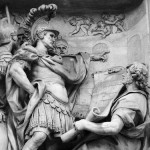We run our website the way we wished the whole internet worked: we provide high quality original content with no ads. We are funded solely by your direct support. Please consider supporting this project.

Jesus and Nationalistic Violence
Throughout the Old Testament, we find Israel spoken of as God’s “chosen nation.” The Israelites were to be a nation of priests whom God wanted to use to unite the world under him (Ex 19:6). Since nationalism and violence inevitably go hand in hand, as Jacque Ellul and others have noted, the covenant God made with Israel naturally included protection from their enemies in exchange for their compliance with his law (e.g. Deut. 27-28).
By the time Jesus came on the scene, however, Israel had fallen into exile. For most Jews, this could only be explained as an aspect of a covenantal curse. They were being punished because of their disobedience. Though they were in their land, they were yet in spiritual exile. (This is the argument made throughout the work of N.T. Wright. See his The New Testament and the People of God, pages 268-272.) Yet, based on a number of OT prophecies, most Jews continued to look for a future Messiah who would restore Israel’s loyalty to Yahweh, lead Israel in a military conquest over her Roman oppressors and make Israel once again a sovereign nation, thereby demonstrating to the world the supremacy of Yahweh and their own chosen status under him. In other words, many if not most Jews of Jesus’ time wanted and expected a militaristic and nationalistic Messiah.
Though Jesus’ miracles gave people reason to believe he was the Messiah, he refused to play this role. In fact, though it is deeply woven into the OT, Jesus repudiated Jewish nationalism and the violence that came with it. This much is clear in his inaugural sermon given in his hometown synagogue. Jesus read from Isaiah 61, a passage that declared that God’s anointed one would bring good news to the poor, set captives free and declare the year of the Lord’s favor. Amazingly, Jesus announced that this prophecy was in the process of being fulfilled in him (Lk 4:18-19).
Now, one might have thought that the people he grew up with would have rejoiced in this announcement, but in fact they became enraged. Their response is puzzling until we consider that when Jesus read this passage, he left out the clause in Isaiah that adds that the anointed one would declare “the day of vengeance of our God.” To many first century Jews, this was the punch line of the passage! Whatever else the Messiah was going to do, they expected him to crush Israel’s evil oppressors, the Romans.
To make matters worse, Jesus responded to his irate audience by alluding to two OT stories in which God’s favor by-passed Israelites and was given instead to people in nations that opposed Israel (Lk. 4). Far from God vanquishing Israel’s enemies, Jesus was suggesting that the Good News he was bringing would embrace enemies and other “outsiders” while sometimes by-passing “insiders.” As reflected in his numerous “reversal” teachings, Jesus taught that those who were confident they were in the Kingdom would often find themselves out, and those that everyone assumed were outside the Kingdom would often find themselves in. (The parables of Luke 15 make this point.) As happened at other points in his subsequent ministry, Jesus’ “reversal” teaching upset his audience so much they tried to kill him (Lk 4:29). This whole episode, which in Luke’s Gospel serves as a sort of inauguration address, clearly reveals that Jesus did not buy into the Jewish nationalism and militarism of the Old Testament.
Understood in its original historical setting, it becomes apparent that Jesus’ teaching on unconditional love and non-violence was nothing less than a repudiation of the violence-justifying nationalism that runs throughout the OT. While the Jewish people initially established themselves as a nation in the promised land through genocidal violence, and while multitudes expected the Messiah to lead them in a violent uprising to reestablish Israel as a sovereign nation in this land, Jesus taught that it was “the meek”—and not only the meek among the Jews—who would inherit the land (Mt. 5:4).
Jesus’ rejection of nationalistic, violence-prone exceptionalism is also suggested by the way Jesus sometimes praised Gentiles, Samaritans, and even Roman military officers as heroes of faith, often disparaging Jewish leaders in the process. Also significant is the trans-national vision and call of the kingdom that Jesus shared throughout his ministry. Though some of Jesus’ disciples had a hard time getting it (e.g. Peter in Acts 10), Jesus inaugurated a kingdom in which a united new humanity would be birthed and in which all national, ethnic, sociological and gender distinctions are rendered insignificant.
Finally, Jesus’ rebuke of Peter for trying to use the sword to defend him as well as his refusal to call on warring angels to fight on his behalf are clear repudiations of the violence-prone nationalism of the OT. The Messiah was supposed to rise up in the strength of God and with the support of the people and vanquish Israel’s opponents, not get crucified by them! This becomes all the more clear when Jesus cites the non-violence of his followers to Pilate to prove that his kingdom is not of this world (Jn 18:36). If Jesus had been the king of Israel or any other worldly nation, there obviously would have been bloodshed. The fact that there wasn’t bloodshed (except for Jesus’ own) proves his kingdom is not of this world, nor of any violence-prone nationalism.
Photo credit: douglas_coldwell via Visualhunt / CC BY
Category: General
Tags: Cruciform Theology, Kingdom of God, Nationalism, Non-Violence, Peace
Topics: Enemy-Loving Non-Violence
Related Reading

Little Pacifism
Richard Beck spoke about something he names Little Pacifism on his Experimental Theology website. It’s so easy, in the name of peacemaking, to become angry and aggressive. I suppose this is just part of what it means to be human. However, if we hope to bring the Kingdom of God closer the earth (and to…

Podcast: Is Open Theism an Accommodation?
Or for that matter is accommodation an accommodation? Greg talks about things that impact God. http://traffic.libsyn.com/askgregboyd/Episode_0407.mp3

Can Bible Imperfections IMPROVE the Reliability of the Bible? (podcast)
Greg talks about his new book: Inspired Imperfection: How the Bible’s Problems Enhance Its Divine Authority. Episode 537 http://traffic.libsyn.com/askgregboyd/Episode_0537.mp3

Why Didn’t Jesus Denounce Military Service?
A common objection to the claim that Jesus and the authors of the New Testament were opposed to all forms of violence is that neither Jesus nor anyone else speaks out against it. When soldiers asked John the Baptist what they should do in response to his message, for example, he told them not to…

Cruciform Aikido Pt 3: The Judge Who Lets Them Have It
We ended our last post noting that in the cross God ingeniously turned evil back on itself and triumphed over it. But what does all this teach us about the nature of divine judgment? Two things. First, as the one who bore our sin, Jesus experienced the judgment we deserved when the Father withdrew himself and…

Atonement: What is the Christus Victor View?
Most western Christians today understand the atonement as a sort of legal-transaction that took place between the Father and the Son that got humanity “off the hook.” The legal-transaction scenario goes something like this: God’s holiness demands that all sin be punished, which in turn requires that sinners go to eternal hell. The trouble is,…
